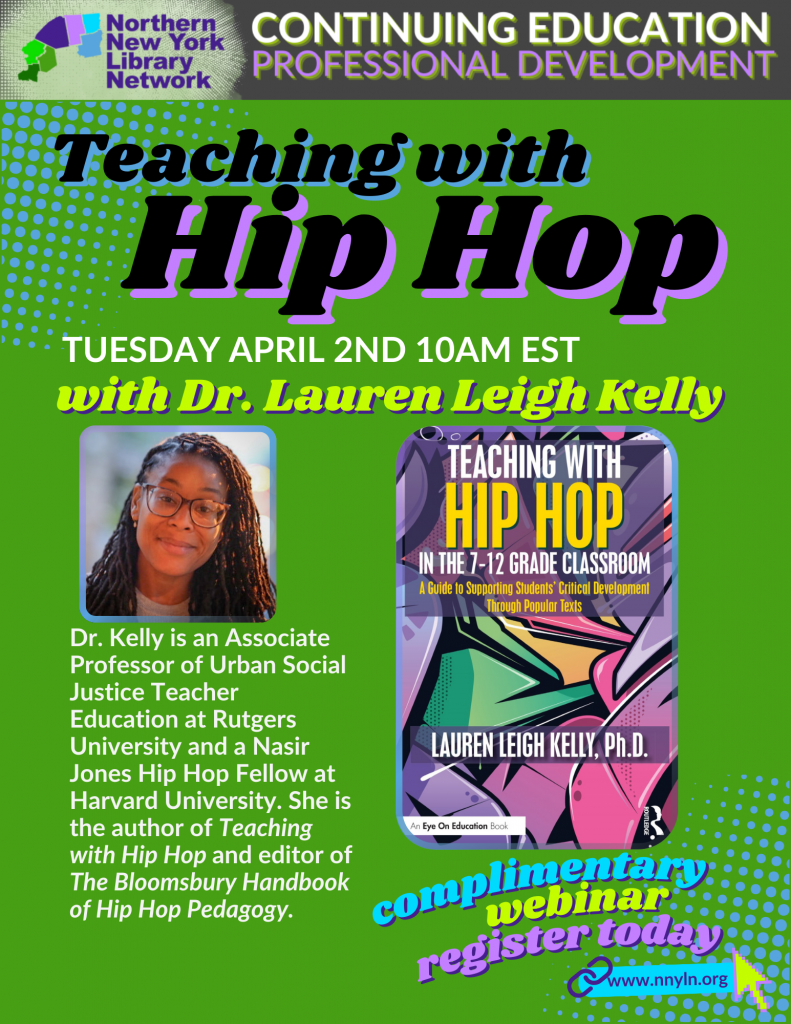with Dr. Lauren Leigh Kelly
Exploring History, Media, and Culture through Geographic Literary Analysis
This workshop relates to the Institutional theme of Equity Pedagogy and supports the development of Hip Hop literacies as well as sociohistorical understandings of cultures and communities through the examination of Hip Hop narratives in rap lyrics. Participants will work in groups to read diverse Hip Hop narratives rooted in particular times geographic locations. Using internet resources, each group will research the locations referenced in the songs and discuss the social, historical, and lyrical significance of this place both within and outside of Hip Hop culture, including local knowledge. We will also explore the relationship between time and these locations. Through research, geographic mapping, critical reading, and discussion, participants will work collaboratively to contextualize the authors and narratives of these Hip Hop texts through understandings of the histories, cultures, people, and locations that are embedded in them. Attendees will receive a 20% discount code for Dr. Kelly’s Routledge publications.
Agenda
10 minutes: Brief overview of Hip Hop Literacies
25 minutes: Group Work
15 minutes: Group Presentations and Q&A
10 minutes: Closing- How can we bring these ideas and activities into our work with students?
American Association of School Librarians Learning Standards
I. INQUIRE: Build new knowledge by inquiring, thinking critically, identifying problems, and developing strategies for solving problems.
III. COLLABORATE: Work effectively with others to broaden perspectives and work toward common goals. IV. CURATE: Make meaning for oneself and others by collecting, organizing, and sharing resources of personal relevance.
VI. ENGAGE: Demonstrate safe, legal, and ethical creating and sharing of knowledge products independently while engaging in a community of practice and an interconnected world.
Association for College and Research Libraries Framework for Information Literacy
Authority Is Constructed and Contextual Information Creation as a Process
Information Has Value
Research as Inquiry
Scholarship as Conversation
Searching as Strategic Exploration
Common Core English Language Arts Standards » History/Social Studies » CCSS.ELA-LITERACY.RH.11-12.1 Cite specific textual evidence to support analysis of primary and secondary sources, connecting insights gained from specific details to an understanding of the text as a whole.
CCSS.ELA-LITERACY.RH.11-12.2 Determine the central ideas or information of a primary or secondary source; provide an accurate summary that makes clear the relationships among the key details and ideas.
CCSS.ELA-LITERACY.RH.11-12.8 Evaluate an author’s premises, claims, and evidence by corroborating or challenging them with other information.
CCSS.ELA-LITERACY.RH.11-12.9 Integrate information from diverse sources, both primary and secondary, into a coherent understanding of an idea or event, noting discrepancies among sources.
CCSS.ELA-LITERACY.RI.9-10.1 Cite strong and thorough textual evidence to support analysis of what the text says explicitly as well as inferences drawn from the text.
CCSS.ELA-LITERACY.RI.9-10.6 Determine an author’s point of view or purpose in a text and analyze how an author uses rhetoric to advance that point of view or purpose.
Presenter Bio:
Dr. Lauren Leigh Kelly is an Associate Professor in the Urban Social Justice Teacher Education program at Rutgers University’s Graduate School of Education. She is also the Founder of the annual Hip Hop Youth Research and Activism conference. Kelly taught high school English for ten years in New York where she also developed courses in Hip Hop Literature and Culture, Spoken Word poetry, and Theatre Arts. She also taught Hip Hop Literature at Five Towns College in New York; English Composition at Medgar Evers College, The City University of New York; and the Teaching of English at Teachers College, Columbia University. Additionally, Kelly provides professional development for teachers developing Hip Hop pedagogies in K-12 and college teaching across the United States.

